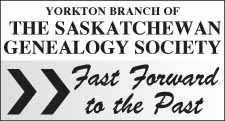Tracing your family tree can be a difficult challenge at best. However, if you are researching ancestors who have been enslaved in the United States, the task is even more daunting. Local Genealogist and member of the Yorkton Branch of the Saskatchewan Genealogy Society, Doris Maben, has been doing just that. Here's part of a fascinating interview with Doris.
How did you get involved? When my sister retired a few years ago, she began doing genealogy research regarding Afro-Americans (e.g., underground railroad, abolitionist, slavery, etc.) As a result, I became interested. When I retired from work last year, I became active with the Yorkton Genealogy Society and started doing more genealogy research and family histories for others. Plus, I registered and began to take classes for basic certification from an online genealogy program in Toronto.
As for researching my own family, I was able to find records dating back to the 1870s. But then I hit the "brick wall" that so many Afro-Americans have come up against in researching their enslaved ancestors. Since I seemed to be experiencing such a difficult time finding ancestral information prior to the 1870s, I realized that I maybe looking for information on enslaved human beings. As a result, I began searching the "slave schedules" which were released online with the 1850s and 1860s census. Prior to the emancipation of slaves in 1865, slaves had no last names. They were the property of their slavemasters.
So what did you do? I realized that I needed more information about Afro-American History. So, I joined Black Genealogy discussion groups from the United States which I found on facebook. Last November, 2013, one of the genealogy groups notified all of their members of a new online course soon to be presented from the coursera program. This was a free, 10 week course called "History of the Slave Â鶹ÊÓƵ". It was to be taught by a "top notch" University of Pennsylvania, History Professor and Civil War researcher, Dr. Stephanie McCurry.
What is the Coursera Program? The coursera program(go to coursera.org) started in 2012. It offers many different, free courses from universities all over the world to anyone. They are called MOOC (Massive Open Online Courses). EdX(EdX.org) is another similar program.
For the "History of the Slave Â鶹ÊÓƵ" course we were required to watch superb, highly informative, short video lectures from Professor McCurry, do readings, short essays and participate in written discussion of the assigned material.
There were over 12,000 students from all over the world taking this course when I took it last January 20, 2014.
What advice can you offer others who are interested in genealogy? Know the history of the area where your relatives came from. In a family tree format(i.e., like a pedigree chart), start with yourself, your parents, grandparents, and continue to go back further to discover earlier ancestors. You need to realize that you must be prepared to prove to your ancestral results. This means that you have to search for facts both on and off of the internet websites. And very important, don't be afraid to ask other genealogists for help with your "brick walls".
Good advice, Doris!
The Yorkton Branch of the Saskatchewan Genealogy Society meets once a month and welcomes people at all stages of research. Every family has a story: discover yours with the
Yorkton Genealogy Society!




